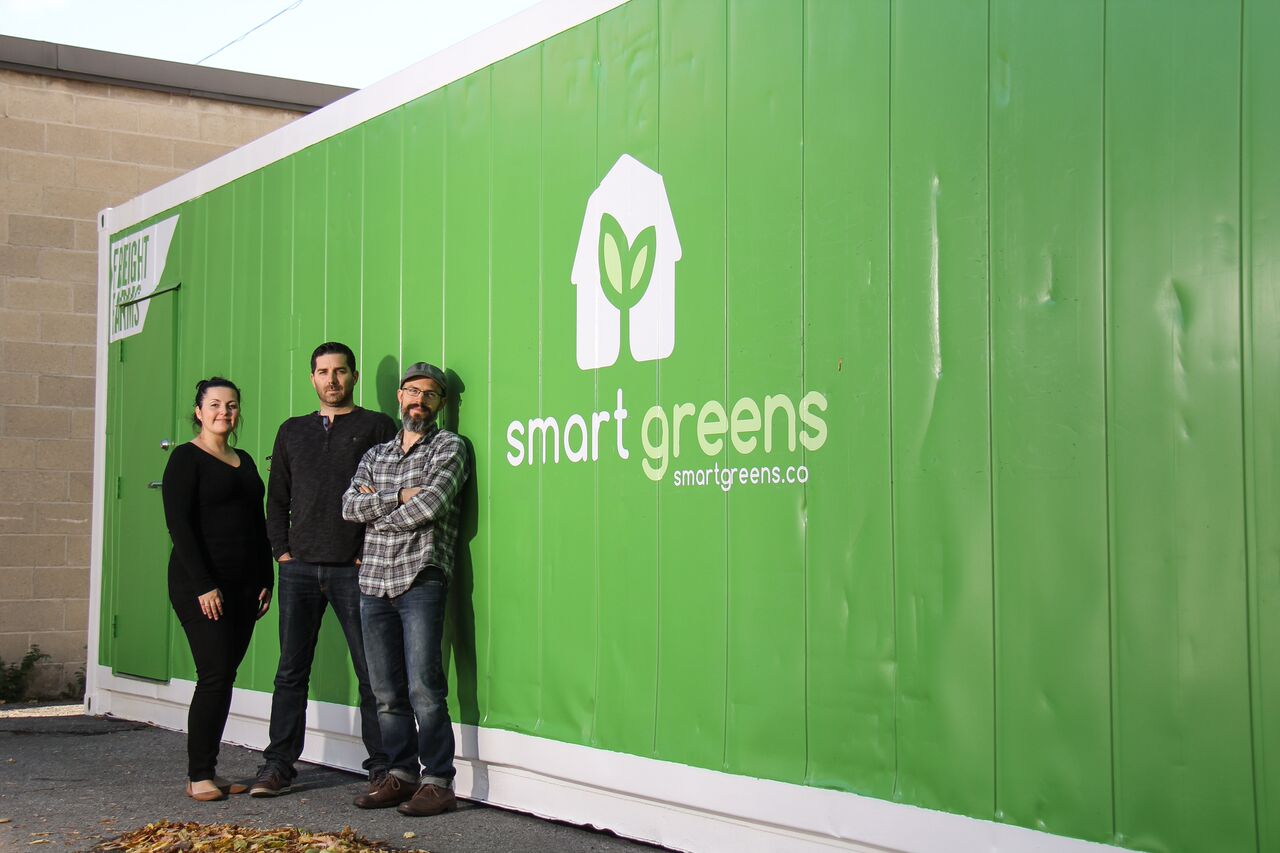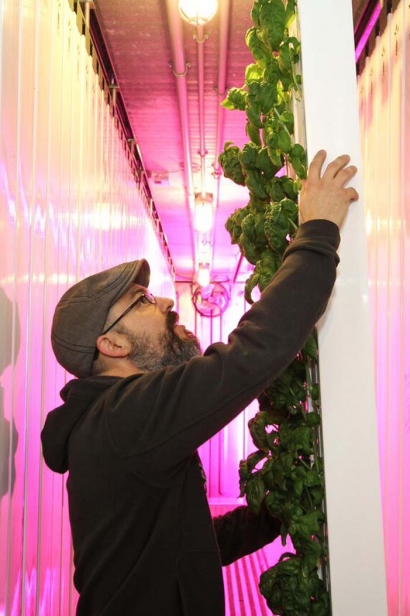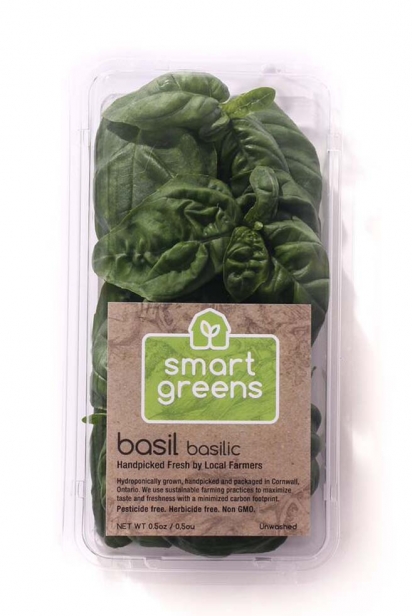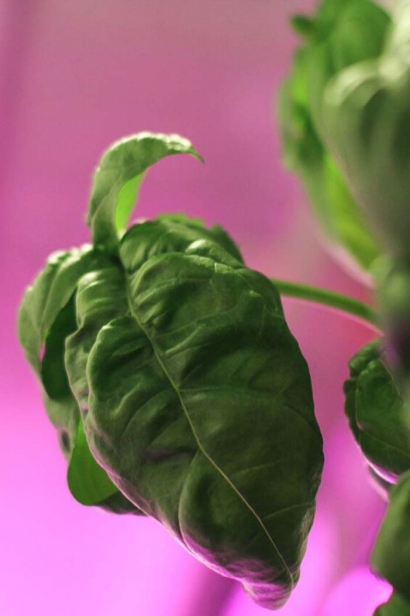Lights, Water, Action
In an ideal world, our farmers’ organic crops would sprout extravagantly in God’s green earth. That’s something even Eric Bergeron, a founder of a technology-based farming company in Cornwall, will acknowledge. “We know that organic farming in dirt is the best way to grow food,” he says. But sometimes the ideal and the practical run in different directions. Organic farming is dependent on the season, and while the majority of greens are imported from Mexico and California, Smart Greens can deliver hyper-local greens year-round.
Bergeron’s solution? A new form of farming — sometimes called vertical farming — that produces regular crops, makes sunlight and rainfall irrelevant, uses water and power efficiently and, best of all, can put food on our plates the same day it is harvested.
His company, known as Smart Greens, is growing astonishing quantities of lettuce and kale in a shipping container in downtown Cornwall. Farming of this type is the way of the future, Bergeron and his partners say. In a world threatened by incessant population growth, global warming, and continued shrinking of cropland, it may offer the best chance of ensuring adequate food for future generations.
“We’re looking to care for the future of our planet,” Bergeron says. “We have, I think, about 10 years to find a way of farming sustainably as global warming continues. That’s important for everyone — and in my own life, I want my two daughters to be able to afford to eat healthy food when they’re older.”
Global warming won’t have any effect on the plants sprouting week after week in the Smart Greens shipping container. Inside is a fullyfunctioning hydroponic farm. LED lights provide the equivalent of sunlight, a closed-circuit irrigation system provides the water, and heating and air conditioning systems ensure that plants flourish in optimum temperatures. There’s not even soil, since the plants grow in peat moss constantly suffused with dripping water enriched with plant nutrients.
“We have no pesticides, use no genetically-modified seeds — and we deliver the crops the same day they’re harvested. You couldn’t have healthier or fresher food.”
A bit more than two years ago, Bergeron and his wife, Allison St. Louis, were both looking to change careers when they saw that a Boston company, FreightFarms, was raising money on Kickstarter to build a prototype vertical farm in a shipping container. They were intrigued, Bergeron says. “This seemed to tick off all the boxes. We care about food security, anything tech-based interests me as a former internet marketer, and it would give us the opportunity to do something together.”
They were soon joined by a business partner, Eric Amyot, who shared their interest in food security. Bergeron and Amyot intend to set up a Smart Greens franchise that will see vertical farms in place across Canada, operating under the company brand. Though duties overlap, Bergeron, for now, is primarily acting as the company’s harvester and farmer while Amyot attends to the sales and customer work involved in setting up the franchise.
When the prototype was built, they went down to Boston to have a look. They were impressed and bought one, the first that has been brought across the border.
The container cost them $80,000 U.S. To bring the container up to Canadian safety standards and to meet other startup costs, they invested a further $40,000. By fall of 2014, they had planted their first crops and were teaching themselves the niceties of plant husbandry.
“We spent the first year experimenting and growing different produce, verifying the amounts we could actually grow,” Bergeron says. “For now, we’ve settled on lettuce and kale.”
Where most outdoor farms will plant only one nor two plants per square foot, the stacked arrangement of vertical farming allows 240 plants per vertical square foot to be grown.
“It’s really amazing,” Bergeron says. “Over a year, our farm, in its footprint of 320 square feet, can produce 52,000 heads of lettuce — roughly 12 times what a regular farm could grow on an acre of land.”
The water is recycled so that consumption is miniscule, roughly two per cent of what conventional farming requires.
Smart Greens began commercial operations at the start of 2015 and Bergeron says the company is finding that stores and restaurants are intrigued by the idea of using completely fresh, locally grown produce. Cornwall sells out by providing greens to CSA members and two restaurants in the city. In the longer term, Bergeron and his partners want to have franchise operations across Canada. “At first, we envisioned 50 franchises — but the more we dig in, the more we think there’s room for 150.”
Smart Greens itself would operate hubs in Ottawa and Toronto, leaving the rest of the country to its franchisees.
With vertical farming, most growers tend to focus on leafy greens — but a few, south of the border, are beginning to have good luck with cucumbers, peppers, eggplants and even strawberries. The commercial possibilities, to this point, are limited, since LED technology is too expensive and limited in power to make large-scale production of such crops easy. “But the technology is advancing rapidly,” Bergeron notes. “Imagine really fresh strawberries year round — that would be the ultimate!”
If the economics of getting a shipping container up north work out, he can imagine a Smart Greens operation selling lettuce to consumers in Nunavut. “That would be optimal,” he says. “The cost of food up there is criminal—and, if things work out, that doesn’t have to happen any more.”
Originally, Bergeron and Amyot were planning to act as distributors for FreightFarms, but they are now developing prototype containers on their own with a builder in Brampton. These containers, they believe, will be more suitable for the Canadian climate.
It’s an ambitious vision that animates the company, but it all comes down to ensuring the continued availability of good food as global warming encroaches.
“We can’t wait on this,” Bergeron says. “And as more and more people become aware, I am sure that vertical farming will take off all over the world.”
Smart Greens
44 Pitt St., Cornwall, Ont.
smartgreens.co, 613.363.6040








